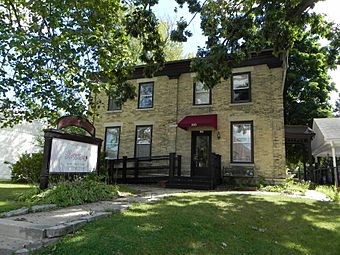Stephen Warren House facts for kids
Quick facts for kids |
|
|
Stephen Warren House
|
|

Stephen Warren House
|
|
| Location | 235 E. Capitol Dr., Hartland, Wisconsin |
|---|---|
| Area | less than one acre |
| Built | 1855 |
| Architectural style | Greek Revival |
| MPS | Hartland MRA |
| NRHP reference No. | 86003432 |
| Added to NRHP | December 8, 1986 |
The Stephen Warren House is a special old house located in Hartland, Wisconsin. It was built around 1855 for Stephen Warren. He was the very first European settler to live in the Hartland area.
This house is important because it shows us what homes looked like a long time ago. It also reminds us of the person who helped start the community of Hartland.
Contents
Discovering the Stephen Warren House
The Stephen Warren House is a two-story building. It is made from cream-colored bricks. These bricks sit on a strong stone foundation. The house was built around the year 1855.
It was designed for Stephen Warren. He was the first European person to settle in Hartland.
A Look at Its Design
The house has a style called Greek Revival. This style was popular in the 1800s. It often looks like ancient Greek temples.
You can see this style in the house's details. For example, it has brick pilasters. These are flat, column-like shapes on the walls. They support a wooden entablature, which is a decorative band above them.
Experts say this house is a great example of Greek Revival style in the area. Many other old houses like it have changed over time. This house still looks much like it did when it was built. It is also the last clear reminder of Hartland's founder.
Who Was Stephen Warren?
The house belonged to Stephen Warren. He was an important person in the community. Stephen and his younger brother, Dewey, both became members of the Wisconsin State Assembly.
The Wisconsin State Assembly is a group of people. They make laws for the state of Wisconsin. Stephen Warren helped shape the early laws of his state.
A Recognized Landmark
The Stephen Warren House is officially recognized as an important historical site. It was added to the National Register of Historic Places in 1986. This is a list of places across the United States that are worth preserving.
Later, in 1989, it was also added to the State Register of Historic Places. This means it is recognized as important to Wisconsin's history.

